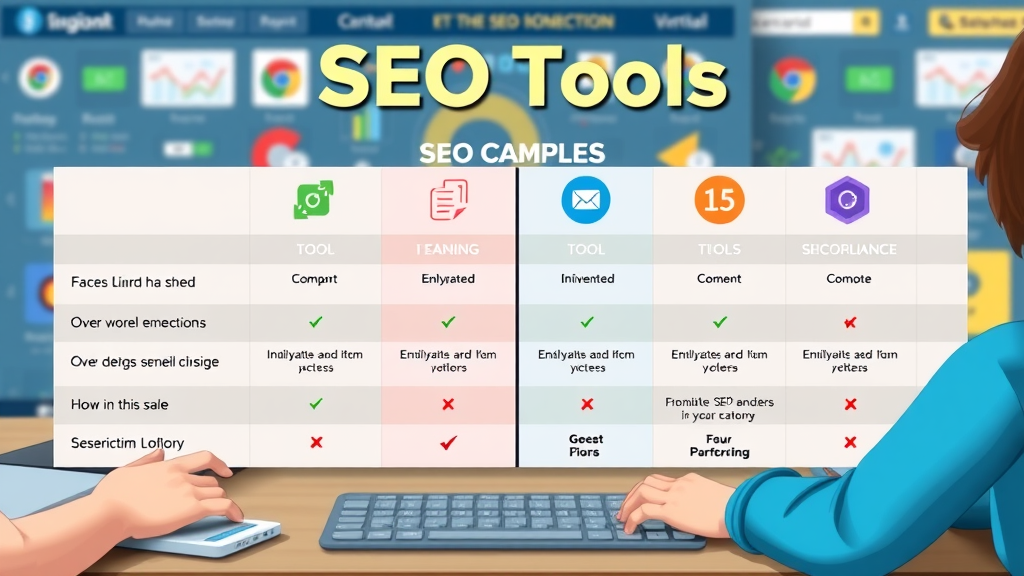Are you wondering why your website isn’t reaching the top of Google or converting visitors into loyal customers? The answer may hide in the secrets of SEO—and mastering this could be the missing link to your business growth. Dive in to discover seo how? truly works and how you can unlock higher rankings starting today.

Unlocking SEO How? The Road to High Rankings
In today’s digital landscape, understanding the question “seo how?” is the key to transforming your online presence and accelerating your business growth. Search engine optimization is no longer just an option; it’s a necessity for brands striving to capture organic traffic and stay ahead of the competition. Whether you’re a small startup or an established business, the right seo strategy bridges the gap between your website and the millions searching for your products and services.
Businesses that master engine optimization gain a competitive advantage by tapping into high-quality search traffic. Every time customers type a query, search engines measure your relevance and authority. If you’re not showing up, you’re leaving opportunities—and revenue—on the table. The real secret lies in understanding the “how” behind SEO: How does SEO really drive business growth? Why does asking ‘seo how?’ matter even more as competition increases? And what foundational knowledge must you have before embarking on your journey toward search engine optimization success? These answers reveal not just how to reach page one, but how to build a sustainable, measurable path to business growth through search.
How does SEO really drive business growth?
Why the 'seo how?' question matters now more than ever
What you must know before starting your SEO journey

What You'll Learn In This Comprehensive Guide to SEO How?
As you move through this guide to SEO, you’ll uncover the core principles that power search engine optimization, plus actionable steps you can start using immediately. We break down the essentials so you can build an SEO strategy that actually works for your website and business model.
This comprehensive educational content arms you with:
The fundamentals of search engine optimization explained simply
Step-by-step processes behind effective seo strategy
How to select and use essential seo tools
Understanding key ranking factors affecting search engine visibility
Pro tips for technical SEO and link building
Measuring, monitoring, and refining SEO success
How to leverage social media, internal linking, and blog posts for even more search traffic

Understanding SEO How? The Foundation of Search Engine Optimization
What is Search Engine Optimization and Why It Matters
Search engine optimization (SEO) is the process of enhancing your website’s visibility in search engines like Google, Bing, and Yahoo. When your content is optimized, it ranks higher on the results page, making it more likely that your target audience will find you online. But SEO isn’t just about pleasing algorithms—it’s about serving real people by answering their questions and providing the value they’re searching for.
The importance of SEO how? goes beyond traffic. Businesses investing in SEO enjoy sustained growth, increased credibility, better user experiences, and ultimately, more sales. By understanding the principles of search engine optimization, you empower your website to attract not just any visitors, but the right ones—those searching for exactly what you offer. In a world where billions of people search for solutions daily, visibility in search results is vital. That’s why implementing a tailored, data-driven seo strategy is essential for thriving online.

SEO How? Step-by-Step and the Guide to SEO Strategy
As you refine your SEO approach, it's also valuable to consider how digital branding can amplify your online presence and set your business apart in competitive markets. For actionable insights tailored to entrepreneurs and tech leaders, explore this guide on digital branding strategies for tech entrepreneurs and discover how branding and SEO work hand in hand.
Initial Keyword Research: Identifying Opportunities
Every successful seo strategy starts by uncovering what your audience is searching for. Keyword research is your map in the world of engine optimization, directing you to high-potential topics and underserved queries. By using a reliable seo tool, such as SEMrush or Ahrefs, you can analyze competitors, discover search volumes, and spot trends.
The key is not just to chase high-volume keywords, but to identify “long-tail” phrases that attract qualified traffic ready to convert. Examine your competition’s blog posts and search results for inspiration. Filter and prioritize keywords based on relevance, intent, and how well they match your existing content or business goals. This foundational step directly impacts your site’s potential in both organic search and revenue growth, making it a must-have in any guide to SEO.

On-Page SEO: Optimizing Blog Posts and Website Pages
On-page SEO refers to all the actions you take directly on your site to improve rankings in search engines. Optimizing blog posts and product pages involves more than sprinkling in keywords—it’s about creating content that addresses search intent, solves real problems, and keeps users engaged. Meta descriptions should be compelling, concise, and include target keywords, acting as ad copy to entice clicks from searchers.
Internal linking is a pro tip often overlooked. By adding internal links between related blog posts or from high-traffic pages to new content, you distribute authority across your website and increase session length. Don’t forget technical aspects like using alt text in images for accessibility and keyword relevance—which also helps your rankings in image search. Make your content actionable, use headers strategically, and update old blog posts for ongoing engine optimization.
How to craft compelling meta descriptions
Using internal links to support SEO
Off-Page SEO: Link Building and Social Media
Off-page SEO extends beyond the confines of your website and relies heavily on link building and leveraging social media. Backlinks from authoritative websites signal trust to search engines, directly impacting your site’s credibility and rankings. Strategic outreach, guest posting, and digital PR are some of the most effective ways to build a powerful backlink profile for your seo strategy.
Social media amplifies your search traffic by distributing content to a wide audience. While social signals themselves may not be direct ranking factors, increased brand mentions and engagement can indirectly boost your visibility and link-building efforts. Consistently share your best blog posts and participate in industry communities to maximize reach.
Nurturing backlinks for search engine trust
Harnessing social media to amplify your seo strategy
Technical SEO: Behind-the-Scenes Factors
Technical SEO sets the stage for all other engine optimization efforts by ensuring your website’s infrastructure is friendly to both users and search engines. Sites that load slowly, are difficult to navigate, or aren’t mobile-friendly often fall behind in rankings—regardless of how great their content is. Technical SEO includes optimizing site speed, fixing crawl errors, implementing structured data, and ensuring secure HTTPS connections.
Using seo tools like Screaming Frog or Google Search Console, you can audit your site for hidden technical issues. Regularly review and update sitemaps, repair broken internal links, and minimize duplicate content. These tasks may seem “behind the scenes,” but they’re crucial ranking factors that remove obstacles between your pages and the top of the search results.

SEO Tools: Essential Solutions for Effective Engine Optimization
The right seo tools can mean the difference between guesswork and data-informed decision making. Tools like Ahrefs, SEMrush, Moz, and Google Search Console offer everything from keyword research and technical SEO audits to backlink analysis and rank tracking. Utilizing these seo tools empowers you to monitor your competitors, understand your search traffic, and evaluate what’s working—or not—in your current seo strategy.
When selecting an seo tool, consider your business needs. Are you focused on optimizing blog posts and tracking keyword rankings, or do you need robust technical analysis and link data? Different tools offer unique combinations of these features. Use this comparison table to find the best fit:
SEO Tool |
Keyword Research |
Technical Audits |
Link Analytics |
Rank Tracking |
Best For |
|---|---|---|---|---|---|
Ahrefs |
✔️ |
✔️ |
✔️ |
✔️ |
All-in-one, competitor analysis |
SEMrush |
✔️ |
✔️ |
✔️ |
✔️ |
SEO & digital marketing integration |
Moz Pro |
✔️ |
✔️ |
✔️ |
✔️ |
Beginner-friendly UI |
Google Search Console |
Limited |
✔️ |
Limited |
✔️ |
Technical SEO and webmasters |

Decoding Search Intent and User Experience for SEO How?
Aligning Content with Search Intent
One of the hallmarks of modern seo strategy is matching your content with what users actually want—also known as search intent. Successful blog posts and landing pages directly address whether a user is looking to learn, buy, or compare. Analyze current search results for your target keywords to understand the types of content that rank: are they guides, product pages, reviews, or FAQs?
To nail seo how?, ensure every piece of content reflects the user’s journey. Use headers and formatting to highlight key answers, incorporate common questions, and develop resources that keep users engaged. Incorporate internal links to related posts and optimize your meta descriptions to improve click-through from search listings. Tailoring your approach to search intent is an ongoing process, requiring continual content optimization and user feedback.

Improving User Experience for Higher Rankings
User experience directly impacts your search engine rankings. Google and other search engines monitor metrics like bounce rate, page load speed, and ease of navigation to determine which sites best serve users. Creating a visually engaging, fast, and mobile-responsive site is foundational to both retaining visitors and improving organic search performance.
To elevate your seo strategy, regularly assess your website with user testing and analytics. Identify and fix pain points such as confusing menus, broken internal links, or slow-loading images. The more seamless the experience, the greater the trust and likelihood users will convert or return. Pro tip: Update site design and navigation based on real visitor behavior to continuously improve user experience and stay ahead of evolving ranking factors.
Advanced SEO: How? Tactics for Business Growth
Understanding and Using Ranking Factors
Diving deeper into seo how? means leveraging dozens of ranking factors that dictate your site’s position in search results. These range from high-quality, well-structured content, reputable backlinks, and robust site security to mobile accessibility and page speed. A seo pro constantly monitors industry updates and adapts their seo strategy accordingly.
Advanced engine optimization is about prioritizing the factors with the highest impact, such as optimizing for core web vitals, implementing schema markup, and cultivating strong relationships for link building. Integrating tactics like regular technical audits, competitive research, and ongoing blog post updates ensures you maintain strong search traffic as algorithms evolve. Great SEO is a blend of art and science—and with the right approach, you can achieve measurable growth and lasting search engine authority.
Traffic to Your Website: How to Track and Maximize Organic Search
Driving traffic to your website isn’t enough—knowing how to track, analyze, and optimize organic search performance sets winning businesses apart. Tools like Google Analytics and Search Console let you monitor volume, user behavior, and which keywords are actually moving the needle. Look for pages that convert, and spotlight blog posts capturing valuable search traffic.
SEO how? Discover the Secret to Boost Your Rankings:
Gulf Coast Tech stands out as a go-to hub for emerging technology news, media trends, and industry insights—an ideal model today’s readers want when exploring SEO strategies. Anchoring your content in these evolving themes boosts SEO relevance and positions your site as a forward-looking authority
To maximize performance, continually test new content formats, monitor competitors’ progress, and identify sources of quality backlinks. Focus your efforts where you see the strongest returns—for example, doubling down on topics that consistently generate leads or sales. Remember: Success in engine optimization is an iterative, data-driven process. The most agile seo strategies always outperform “set it and forget it” approaches.
Blog Posts and Blog Post Optimization for SEO
Blog posts serve as magnets for organic search and provide evergreen value as part of your content marketing and seo strategy. Well-optimized blog posts can rank for many keywords and position your brand as an authority. Focus on topics where you can add unique insights, answer common questions, or solve industry pain points.
Optimize your blog posts by using headers to create a logical structure, incorporating relevant images, and embedding internal links to related articles. Include meta descriptions and strategic keywords naturally—never at the expense of readability. Don’t forget the power of cross-promoting blog posts on social media and leveraging internal linking to keep users exploring your site. These best practices amplify your search engine optimization foundation and extend your content’s reach.
Structuring blog posts for maximum organic search impact
Integrating social media and internal linking in your blog strategy
“Great SEO not only draws visitors—it delivers the right visitors ready to convert.”
People Also Ask About SEO How?
How do you actually do SEO?
Achieving SEO success is a systematic process: begin with thorough keyword research to identify target queries. Next, perform on-page optimization, including crafting engaging meta descriptions and using strategic internal links. Create high-quality content aligned with search intent, apply technical SEO fixes to boost performance, focus on link building, and then measure, test, and adjust your engine optimization strategy continuously for lasting impact on search engine rankings.
Watch: SEO How? A Visual Step-by-Step Guide
What is SEO step by step?
Step 1: Conduct keyword research.
Step 2: Optimize content and meta descriptions.
Step 3: Apply on-page SEO techniques, using internal linking.
Step 4: Build quality backlinks.
Step 5: Improve technical SEO.
Step 6: Monitor, test, and refine your seo strategy for ongoing improvement.
What are the 3 C's of SEO?
The 3 C's are:
Content—creating quality, relevant blog posts and website pages;
Code—focusing on technical optimization of your website; and
Credibility—building authority through backlinks and an active social media presence.
What is the 80/20 rule for SEO?
The Pareto Principle or 80/20 rule in engine optimization means that roughly 80% of your results come from 20% of focused activities. Identify and prioritize strategies—like targeting core ranking factors, high-value keywords, and consistently updating top-performing blog posts—to optimize for the greatest impact on traffic and conversions.
Key Takeaways: SEO How? for Measurable Business Growth
Mastering seo how? provides a clear roadmap to increased search engine visibility
Continuous improvement is essential—SEO is an ongoing journey
Leverage both technical SEO and human-centric content for the best results
Focus on user experience, blog post optimization, and strategic link building
Frequently Asked Questions About SEO: How?
What role do meta descriptions play in SEO?
Meta descriptions entice users to visit your site from search results. A well-crafted description with target keywords improves click-through rates and signals to search engines what your page is about, indirectly supporting higher rankings.How often should you update your SEO strategy?
Review your seo strategy regularly—at least quarterly. SEO best practices evolve as search engines update ranking factors, so keep monitoring data, updating blog posts, and testing new tactics for continued results.When will you see results from search engine optimization?
Depending on competition and your starting point, results from effective engine optimization may be seen within a few months, but significant gains often take 6–12 months. Consistency in delivering quality content and technical SEO improvements is key.What's the easiest SEO tool to get started with?
Google Search Console is beginner-friendly, free, and offers essential insights into your site’s performance, indexing issues, and keyword rankings. It’s a must-have for anyone learning seo how? and looking to grow their search presence.
Conclusion: Unleash the Power of SEO: How? For Your Business Success
Recap: Strategic use of SEO strategically? unlocks enduring business growth
Commitment to ongoing engine optimization keeps you ahead of competitors
"If you’re not optimizing, you’re disappearing. SEO how? is the answer to digital relevance and reach."
As you continue your journey to SEO mastery, remember that the digital landscape is shaped by constant innovation and visionary thinking. If you're inspired to see how industry leaders are driving change and setting new standards in technology and business, don't miss the opportunity to learn from the best. Discover the stories and strategies of trailblazers at the TechCrunch All Stage Event—where the future of digital growth and innovation comes to life. Exploring these insights can help you stay ahead of trends, fuel your creativity, and unlock new possibilities for your own SEO and business strategies.
Ready to Elevate Your Rankings? Start Your SEO How? Journey Now
Take control of your search engine performance today — get expert help at https://gulfcoasttech.net/ and transform your business growth with proven SEO strategies.
To deepen your understanding of SEO and enhance your website’s performance, consider exploring the following resources:
“SEO Tutorial for Beginners: What to Prioritize (and What Not to)”: This guide offers a comprehensive overview of essential SEO practices, including keyword research, content creation, and technical optimization. (semrush.com)
“What Is SEO - Search Engine Optimization?”: This resource delves into the fundamentals of SEO, covering topics such as audience research, competitor analysis, and the importance of high-quality content. (searchengineland.com)
By studying these materials, you’ll gain valuable insights into effective SEO strategies and best practices to improve your website’s search engine rankings.
 Add Row
Add Row  Add
Add 




Write A Comment